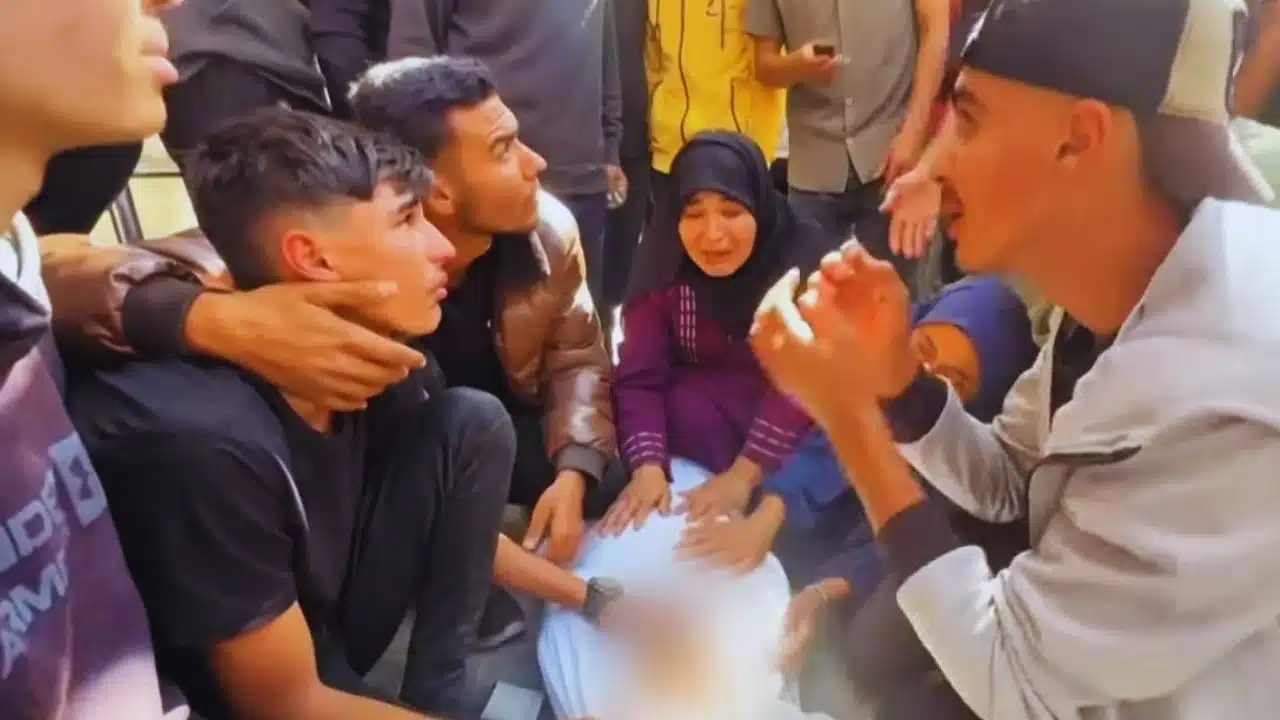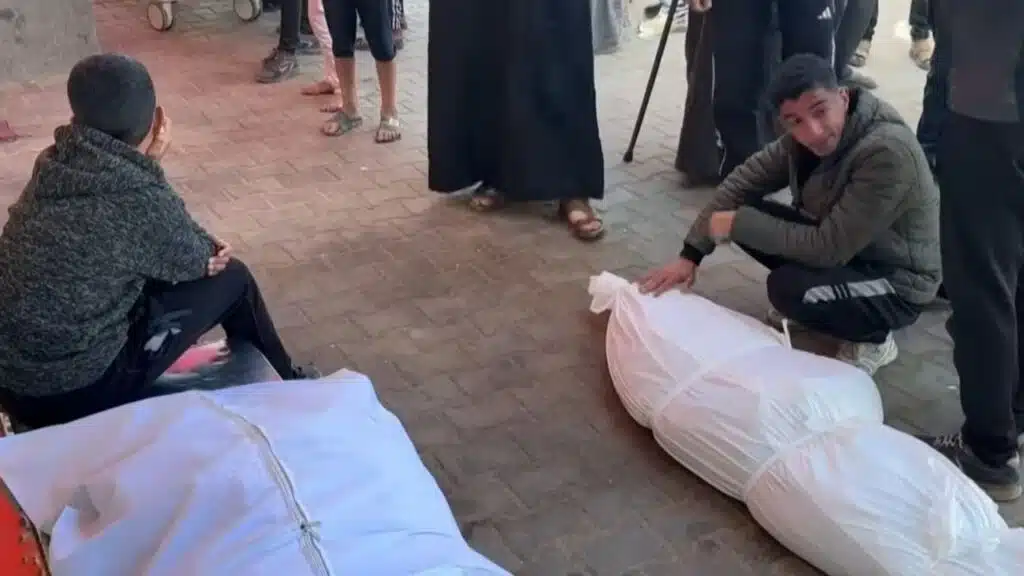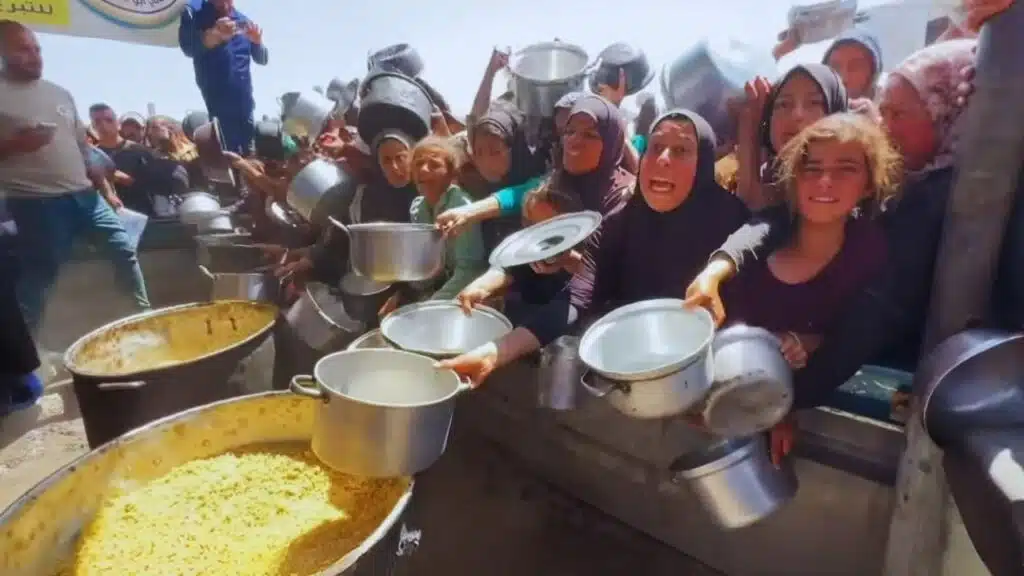The humanitarian crisis in Gaza continues to spiral out of control as Israeli airstrikes on Wednesday, May 7, 2025, killed at least 61 Palestinians, many of them civilians, in multiple densely populated areas of the besieged enclave.
The ongoing Israeli blockade — now into its third month — is accelerating famine-like conditions, as food and fuel supplies have run critically low, healthcare infrastructure teeters on the brink of collapse, and humanitarian operations come to a standstill.
Mass Casualties in Crowded Civilian Areas
In a particularly deadly assault, an Israeli reconnaissance drone launched two simultaneous missiles at al-Wehda Street in Gaza City — one striking the vicinity of the Thai and Palmyra restaurants, and another at a nearby intersection just 100 meters away. These areas were among the few places where food was still accessible, making them frequented by civilians seeking meals. At least 17 people were killed in this twin strike, many of them shredded beyond recognition.
Al Jazeera’s Gaza-based correspondent Hani Mahmoud described the aftermath as gruesome: overturned tables and blood-soaked pavements marked the restaurant area, while human remains lay scattered at the intersection. These restaurants had become rare spots where people could still get food. The attack struck at the heart of what little normalcy people still had,” Mahmoud reported.
In another deadly strike, 13 people lost their lives at the al-Karama School in the Tuffah neighborhood of Gaza City. The school had been sheltering displaced families, a pattern seen in several other targeted locations, highlighting the increasing vulnerability of Gaza’s civilian population — especially those residing in supposed “safe zones” like UN-run facilities.
Nationwide Airstrikes: Children and Families Among the Dead
Strikes were not limited to Gaza City. Casualties were reported across the Strip:
- Jabalia (Northern Gaza): An airstrike on a residential building killed 3 and injured several others.
- Khan Younis (Southern Gaza): A single strike claimed 8 lives, including a father, his children, and their cousins. A separate strike killed a local farmer while harvesting crops — one of the few means left to access food amid ongoing starvation.
- Deir el-Balah (Central Gaza): A tent shelter housing displaced civilians was hit, killing 3, including a child.
- Bani Suheila (Eastern Gaza): A man and his wife died in a house-leveling strike.
- Bureij Refugee Camp: Rescue crews pulled 4 more bodies from the rubble of an earlier Israeli airstrike on a UN school sheltering hundreds. That strike had previously killed over 30 people, according to Gaza’s Civil Defence.
Witnesses described scenes of horror: people “soaked in blood,” children’s limbs torn apart, and bodies buried under collapsed concrete — all in areas that Israel had not previously designated as active conflict zones.
Food Supplies Collapse: Starvation Becoming Weapon of War
Since March 2, 2025, Israel has blocked nearly all entry points into Gaza for humanitarian aid, food, medicine, and fuel — citing security concerns and fears of aid falling into the hands of Hamas. However, this blockade has triggered a full-scale hunger crisis.
According to the World Food Programme (WFP), Gaza’s food stockpiles have now been depleted. No food, fuel, or medical convoys have been allowed in for over seven consecutive weeks. “The food system in Gaza has collapsed,” a WFP spokesperson said. “Markets have nothing to offer. Families are surviving on animal feed, herbs, and bread made from animal corn.
More than 500,000 Gazans are currently classified under ‘catastrophic levels of hunger’, the highest level on the Integrated Food Security Phase Classification (IPC) scale. Children are dying from malnutrition-related conditions. UN agencies have documented over 65,000 children now suffering from severe malnourishment, with dozens of confirmed starvation deaths — most of them children under five.
World Central Kitchen Forced to Withdraw from Gaza
The U.S.-based nonprofit World Central Kitchen (WCK) — which had been a critical lifeline, delivering hot meals and distributing bread — announced on May 7 that it is suspending all operations in Gaza. The organization ran out of food after being denied entry of supplies through border crossings.
After providing more than 130 million meals and 26 million loaves of bread in the last 18 months, we are heartbroken to say we no longer have the supplies to continue,” WCK said in a public statement. This comes weeks after Israeli airstrikes killed seven WCK aid workers in clearly marked vehicles — an incident that drew international condemnation and has further discouraged NGOs from operating in Gaza.
Healthcare System at Breaking Point
Gaza’s hospitals are overwhelmed. According to the Palestinian Ministry of Health and corroborated by AP News and Reuters, 88% of hospital beds are currently occupied. Critical shortages of anesthesia, painkillers, antibiotics, and even basic gauze are causing burn victims — many of them children — to endure operations and recovery with little to no pain management.
Doctors report performing surgeries without anesthesia. “We’re forced to choose who to save,” one surgeon said. “People are dying from infections we could easily treat in other circumstances.
Fuel shortages have also led to the shutdown of incubators and dialysis machines. Gaza’s main oxygen plant has been non-functional since mid-April. Healthcare workers warn that without immediate aid and fuel restoration, thousands more could die — not from airstrikes, but from the collapse of medical services.
Efforts for Ceasefire: Talks Stalled Amid Violence
As the violence escalates, Egypt and Qatar — the two main mediators — issued a joint statement on May 7, reaffirming their commitment to brokering a ceasefire in coordination with the United States. Their message emphasized unity, warned against disinformation, and stressed that efforts to end the war and provide humanitarian relief would continue.
However, optimism remains low. A Hamas official, Basem Naim, declared that “no meaningful negotiations” could occur while “Israel continues the hunger and extermination war.” He accused Israeli leaders of negotiating in bad faith and intentionally weaponizing starvation.
Israel, meanwhile, has signaled a further escalation unless Hamas agrees to ceasefire conditions, which include the release of hostages and the demilitarization of the Gaza Strip.
UN and Global Voices Call for Immediate Intervention
The United Nations Relief and Works Agency (UNRWA) has made repeated pleas for the international community to act before the crisis deepens further. In a post on X (formerly Twitter), the agency said: “The State of Israel must lift the siege. There must be a concerted international effort to stop this humanitarian catastrophe from reaching a new unseen level.”
International human rights groups, including Human Rights Watch and Amnesty International, have described the blockade as collective punishment — a potential violation of international humanitarian law.
Countries such as France, Turkey, Brazil, and South Africa have issued statements urging Israel to open humanitarian corridors immediately and warning of irreversible damage to Gaza’s civilian population if aid continues to be blocked.
A Region on the Brink
Gaza is facing one of the worst humanitarian crises in modern memory. Civilians — particularly children — are dying not just from airstrikes, but from hunger, disease, and the absence of medicine and clean water. While ceasefire talks continue behind closed doors, the situation on the ground grows more desperate by the hour. Aid groups, health officials, and families are pleading for action, but with the border crossings closed and strikes intensifying, relief appears distant — and for many, too late.
The Information is Collected from NYTimes and Yahoo.








































